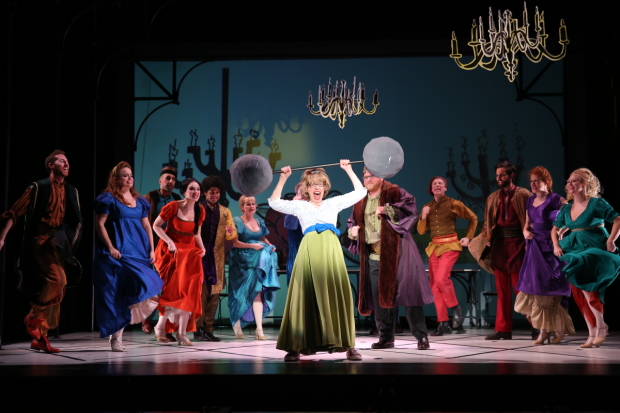Once Upon a Mattress
Jackie Hoffman and John Epperson star in a revival of the cherished Mary Rodgers musical.

(© Carol Rosegg)
If you're looking for an old-fashioned musical, look no further than the revival of Once Upon a Mattress, now playing at Abrons Arts Center under the production of Transport Group Theatre Company. With jazz-infused music by Mary Rodgers and the dramatic heft of a cocktail party joke, Once Upon a Mattress feels straight out of the waning days of Broadway's Golden Age (it premiered in 1959, starring a young Carol Burnett). The show still sparkles with glitz (especially in this competent and highly orthodox production). Beware, however: Nostalgia can be deceiving.
The story goes like this: Once upon a time there was a kingdom ruled over by a talkative Queen (John "Lypsinka" Epperson) and a mute King (David Greenspan). The future of the Kingdom was in doubt. Every time an eligible bride emerged for their son, Dauntless (Jason SweetTooth Williams), the overbearing Queen would scuttle the union by setting up some impossible test, administered by her dastardly wizard (Jay Rogers). This is especially distressing for the common folk as it has been decreed, "Throughout the land no one may wed 'til Dauntless shares his marriage bed."
One day, Lady Larken (Jessica Fontana) reveals to her beau, Sir Harry (a ravishingly scruffy Zak Resnick), that she's carrying his child. The dashing cavalier scours the land for a princess to marry Dauntless, so that he can marry Larken and save her from embarrassment. He finds Winnifred the Woebegone (Jackie Hoffman), the daughter of a faraway swamp kingdom. Scoffing at this rough-hewn would-be consort, the Queen determines to test her sensitivity by hiding a single pea under a pile of downy mattresses. If the pea disturbs her slumber, she's a genuine princess.
Rodgers' music paints this fractured retelling of "The Princess and the Pea" with a classy coat of musical theater high gloss. Offering swooning romance undergirded by an unbreakable rhythm, classic numbers like "Normandy" and "Yesterday I Loved You" exhibit the obvious influence of her father, Richard Rodgers. With their brassy orchestrations, Matt Castle and Frank Galgano give us a sense of what it must have been like to settle into the Alvin Theatre circa 1959, a martini or two safely tucked away.
Unfortunately, the book (by Marshall Barer, Jay Thompson, and Dean Fuller) has not aged as gracefully. Many scenes feel like amusing diversions rather than crucial plot points: The narrating minstrel (a vocally powerful Hunter Ryan Herdlicka) and his friend, The Jester (Cory Lingner, wearing far too much makeup) are dramatically superfluous. Their songs ("The Minstrel, the Jester, and I" and "Very Soft Shoes") feel like musical filler (even though Lingner gives a dance tour de force in the latter). Also, a passage in which father and son break the curse of the King's muteness by asserting their male dominance over mom tastes awfully stale. (Although one could counter-argue that such breezy misogyny is still quite fresh on Broadway: Almost the exact same moment happens in the recently opened School of Rock.) Still, the laughs aren't hearty enough to justify the script's frequent digressions.
Unsurprisingly, the funniest lines of the evening are all ad-libbed by Hoffman.
"When are they going to invent Ambien?" she groans, about to spend a sleepless night on a stack of 20 mattresses. (The answer is 1992, a full 32 years after the original Broadway production closed.) The audience howls. Hoffman keeps us in stitches throughout with her dry line readings and idiosyncratic physicality. She embraces the swinging eccentricity of the score while also poking gentle fun at it, modulating her voice to sound, variously, like a church lady soprano or Billie Holiday. She's a natural fit for the role, much better than the actress who played Winnifred in the last Broadway revival (Sarah Jessica Parker).
Epperson (better known by his drag persona, the famously silent Lypsinka) gives an uncommonly vocal performance as the Queen. Lypsinka's cinematic death stares make a cameo, but Epperson proves to be an equally talented manipulator of voice and speech, pushing his dark vowels ("dahnce" instead of "dance") to the point of lunacy. Taller than everyone onstage (not including hair), this queen definitely cuts an imposing figure.
Drag aside, director Jack Cummings III conjures a fairly conventional (if somewhat budget) staging: Scott Rink's choreography is energetic, but a bit crowded on the Abrons mainstage. Kathryn Rohe presents an array of jewel tone doublets and dresses for her modest medieval costume plot. The one place she has allowed herself to splurge is on the Queen's dresses, which soar into the strata of high fashion: At one point, the Queen's head appears surrounded by what can only be described as a polyester loofah. She's wearing Evil Queen™ by Balenciaga.
Set designer Sandra Goldmark and properties designer Christopher Kavanah focus on the bare essentials, allowing projection designer Andrew Lazarow to engineer the one truly innovative element of this mostly by-the-book production: Cartoonish backdrops project onto the upstage wall for each new setting, with the live hand of Forbidden Broadway illustrator Ken Fallin adding details to the picture, like a theatrical Bob Ross. It looks like a storybook come to life. Future intrepid young Mattress directors take note: This is a wonderfully DIY way to do this show.
One suspects there will be ample opportunity for that, since Once Upon a Mattress is a favorite for stock and amateur theater. And it's easy to see why: Its multiple solo numbers and name characters give everyone a time to shine, even if those moments don't always meaningfully contribute to the story. For that reason, it's likely to remain beloved among theater folk for a long time. We probably won't get another chance to see Jackie Hoffman play an ingenue, though, which is too bad: She's surprisingly good at it.









